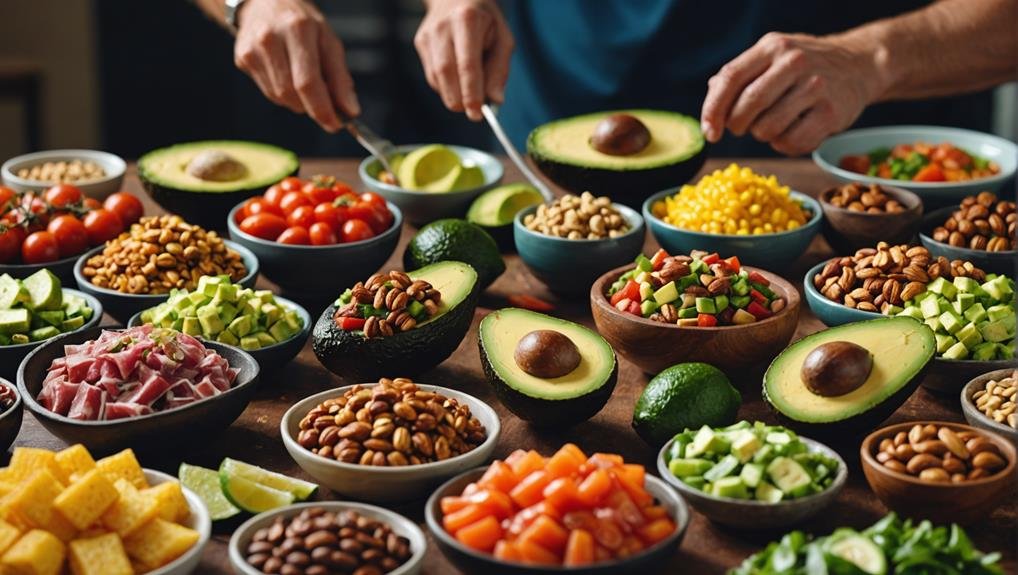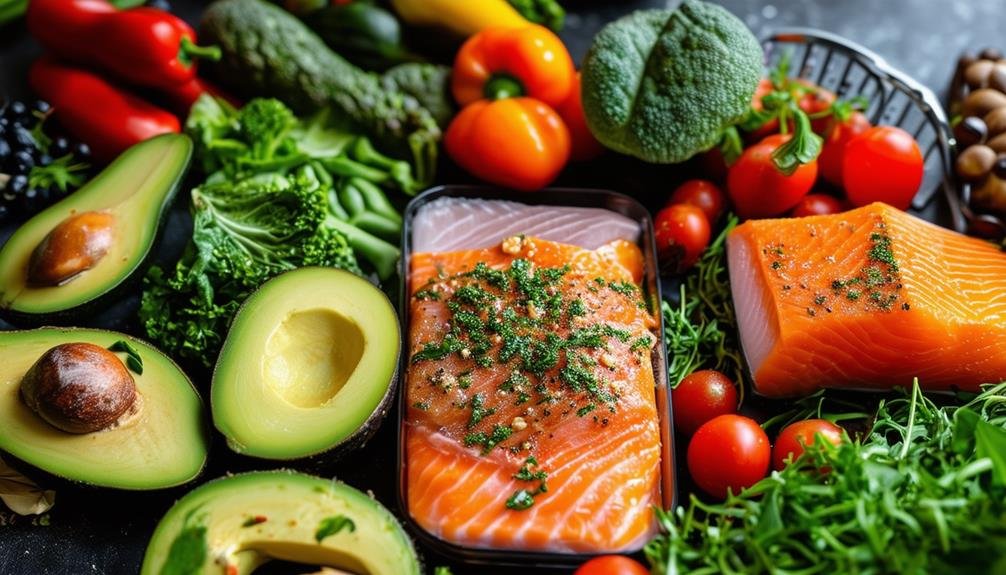Custom keto diet plans can significantly boost athletic performance by transitioning your body's energy source from glucose to ketones, which enhances endurance and speeds up recovery.
These tailored plans optimize macronutrient distribution, typically consisting of 70-75% fats, 20-25% protein, and 5-10% carbohydrates, customized to fit your specific athletic needs. This method helps preserve muscle mass while delivering sustained energy levels.
Furthermore, proper meal timing can enhance both performance and recovery outcomes. However, it's important to recognize potential adaptation symptoms and nutritional risks associated with this diet.
Effectively balancing these factors is crucial for reaching your performance objectives. Comprehensive guidance is available to support your journey towards optimal athleticism.
Key Takeaways
- Custom keto plans offer personalized macronutrient distributions tailored to optimize energy utilization, significantly enhancing athletic performance during both training and competitions.
- Standard macronutrient ratios for these plans typically include 70-75% fats, 20-25% protein, and 5-10% carbohydrates, which facilitate fat adaptation while preserving muscle mass.
- The integration of meal timing and carb cycling techniques can increase energy availability for high-intensity workouts, all while adhering to a low-carb regimen.
- It is crucial to monitor individual energy requirements and adjust caloric intake accordingly to ensure peak performance and effective recovery—key components for athletes following a keto diet.
Understanding Ketosis for Athletes
Understanding ketosis can be crucial for athletes aiming to harness fat as a sustained energy source for training and competition. In a ketogenic state, the body transitions from primarily utilizing glucose to relying on ketones produced from fatty acids. This metabolic shift typically occurs when carbohydrate intake falls below 50 grams daily, promoting enhanced fat adaptation.
As your body becomes more efficient at using fat for fuel, you may experience prolonged energy availability, which is particularly advantageous during endurance activities.
Achieving ketosis isn't immediate; it often necessitates several weeks to months of consistent dietary changes. During this adaptation phase, some athletes may experience temporary side effects commonly referred to as the 'keto flu'. Symptoms like fatigue and reduced mental clarity can occur but usually diminish as the body becomes adept at fat metabolism.
Once fully adapted, many athletes report quicker recovery times post-exercise, likely due to the anti-inflammatory effects of ketones that facilitate muscle repair.
Despite the potential benefits of a ketogenic diet, individual responses can vary significantly based on unique metabolic profiles, training requirements, and performance objectives.
Benefits of Custom Keto Plans
Custom keto plans provide personalized macronutrient distributions designed to meet your unique athletic requirements, helping to optimize energy utilization during physical performance.
By closely aligning with your specific energy needs, these plans ensure you receive the essential calories for intense training and competitive events.
This individualized strategy not only boosts your endurance but also enhances recovery, empowering you to perform at your highest level.
Tailored Macronutrient Distribution
Tailored macronutrient distribution in a ketogenic diet is crucial for maximizing athletic performance by providing the optimal balance of fats, proteins, and carbohydrates. A typical keto plan consists of macronutrient ratios that include 70-75% fats, 20-25% protein, and 5-10% carbohydrates. This distribution sustains ketosis, allowing for enhanced energy utilization during workouts.
Custom plans take into account individual factors such as age, activity levels, and specific performance targets, adjusting protein intake accordingly. This personalized approach supports muscle preservation and improves recovery following intense physical activity. Properly adjusted macronutrient ratios can enhance fat adaptation, enabling more efficient use of fat as the primary energy source during extended exercise sessions while conserving glycogen levels.
Incorporating strategic meal timing and macronutrient adjustments can significantly enhance performance and recovery within a custom keto framework. Optimizing these ratios improves metabolic flexibility, facilitating effective transitions between energy sources during varying intensities of training.
Individualized Energy Needs
Balancing macronutrient ratios is a fundamental aspect of an effective keto diet; however, addressing your individualized energy needs is essential for optimizing athletic performance. Custom keto diet plans consider a variety of factors to ensure that your specific energy levels and performance objectives are met. By personalizing your nutrition, these plans facilitate the use of fat as a primary energy source, thereby enhancing endurance and recovery.
Here's an overview of the factors considered:
| Factor | Description | Impact on Energy Levels |
|---|---|---|
| Age | Younger athletes often require different ratios compared to older athletes. | Influences metabolic rates |
| Body Composition | Leaner athletes often need increased protein intake to support recovery. | Aids in muscle repair |
| Training Intensity | Higher intensity workouts necessitate strategic carbohydrate intake. | Helps sustain peak performance |
| Sport-Specific Needs | Varying energy demands are critical for different sports. | Optimizes fuel utilization |
| Adaptation Process | Gradually shifting into ketosis can reduce the risk of 'keto flu.' | Ensures stable energy levels |
Macronutrient Ratios for Optimal Performance

When it comes to macronutrient ratios for athletes on a ketogenic diet, achieving the right balance is crucial for optimal performance.
It's important to consider your unique nutritional requirements and specific training objectives to effectively tailor your intake.
Ideal Macronutrient Distribution
To optimize athletic performance on a ketogenic diet, athletes should aim for a macronutrient distribution of 70-75% fats, 20-25% protein, and 5-10% carbohydrates. This targeted distribution is essential for maintaining ketosis, allowing the body to efficiently utilize fat for energy. These macronutrient ratios play a critical role in energy production, particularly during strenuous training sessions.
A well-structured nutritional strategy recommends keeping protein intake around 20% of total calories, which supports muscle maintenance without disrupting the state of ketosis. Some athletes may benefit from a carb cycling approach, which involves strategically increasing carbohydrate intake around high-intensity workouts while adhering to a primarily low-carb regimen.
Monitoring macronutrient ratios is crucial to ensure adequate energy levels and recovery, tailored to the demands of the sport. Each athlete's individual metabolic response may necessitate adjustments to their macronutrient distribution.
Consulting with a sports nutritionist can assist in developing a personalized plan that aligns with both performance objectives and dietary preferences. Ultimately, understanding and implementing the appropriate macronutrient distribution can help maximize athletic potential while maintaining a ketogenic lifestyle.
Individualized Nutritional Needs
Understanding your individualized nutritional needs is crucial for optimizing performance on a ketogenic diet specifically tailored to your athletic goals. Personalized nutrition plans should emphasize the right balance of macronutrient ratios to support both training and competition. Generally, athletes thrive on a diet comprising approximately 70-75% fats, 20-25% protein, and 5-10% carbohydrates. However, these ratios may vary depending on individual factors such as age, gender, and the specific demands of the sport.
Below is a clear outline of recommended macronutrient ratios for various types of athletes following a ketogenic diet:
| Macronutrient | Percentage Range | Athlete Type |
|---|---|---|
| Fats | 70-75% | Endurance athletes |
| Protein | 20-25% | Strength training athletes |
| Carbohydrates | 5-10% | High-intensity sport athletes |
When adjusting your intake, consider the timing of your meals in relation to workouts. Proper meal timing can enhance performance, particularly during high-intensity training sessions. It is important to monitor your body's responses and adjust your diet accordingly, potentially seeking professional guidance to effectively meet your unique nutritional needs.
Adjusting Based on Goals
Adjusting your macronutrient ratios according to specific performance goals can significantly enhance athletic outcomes on a ketogenic diet. Each objective necessitates a customized approach to macronutrient intake. By optimizing these ratios, you can improve training efficiency and overall performance.
Here are three essential considerations:
- Muscle Gain: To build muscle, increase protein intake to 20-30% of your total calories. Alongside a caloric surplus of about 500 calories, this strategy can foster muscle growth while maintaining ketosis.
- Weight Loss: For weight loss, reduce your caloric intake by 200 to 500 calories, ensuring the macronutrient balance supports ketosis. This enables efficient fat metabolism while retaining performance capabilities.
- Endurance Training: For endurance optimization, consider maintaining a macronutrient ratio of 70-75% fats, 20-25% protein, and 5-10% carbohydrates. This balance may enhance performance by providing sustained energy for prolonged activities.
Personalized nutrition plans are crucial, as individual responses to these adjustments may vary significantly among athletes.
Meal Planning Strategies
Effective meal planning strategies for athletes following a custom keto diet prioritize achieving the optimal macronutrient balance necessary to enhance performance and recovery. To maintain ketosis while supporting athletic goals, target a macronutrient ratio of 70-75% fats, 20-25% protein, and 5-10% carbohydrates. Focus on incorporating nutrient-dense, low-carb foods such as avocados, leafy greens, fatty fish, and nuts, ensuring you obtain sufficient vitamins and minerals.
Timing of meals is crucial and should align with training sessions. Consuming fats and proteins before and after workouts can boost energy levels and speed recovery. A diverse range of protein sources—like chicken, beef, and eggs—along with healthy fats from sources like olive oil and coconut oil, is beneficial for muscle repair and sustained energy throughout the day.
Additionally, strategize quick snacks for convenience, such as cheese, jerky, or nut butter, to combat hunger while staying within dietary parameters. These meal planning strategies significantly support athletes in optimizing performance while adhering to ketogenic principles.
Addressing Drawbacks and Challenges

While meal planning strategies can optimize athletic performance, adopting a custom keto diet may present several challenges for athletes. Transitioning to this low-carbohydrate, high-fat lifestyle can be difficult, as significantly cutting carbs may negatively impact physical training and performance.
Here are three key challenges you may encounter:
- Adaptation Phase: During the initial adjustment period, commonly referred to as the 'keto flu,' you may experience symptoms like fatigue, nausea, and irritability. These effects can significantly disrupt your training efforts as your body adapts to utilizing fat as its primary fuel source instead of carbohydrates.
- Nutritional Risks: The keto diet often results in insufficient intake of dietary fiber, essential vitamins, and minerals, which can pose nutritional risks. This is especially critical for athletes engaged in high-intensity training, as deficiencies in vital nutrients can adversely affect overall health and athletic performance.
- Strict Limitations: The rigid requirements of the keto diet may complicate optimal nutrition surrounding workouts. Maintaining adequate energy levels can become difficult if you overlook key pre-, intra-, and post-workout nutrition strategies, which are crucial for sustaining performance in endurance activities.
Considering these factors is vital before embarking on a keto diet. Striking a balance is imperative; if the challenges outweigh the potential benefits, it may be necessary to reassess how this diet aligns with your athletic goals and overall performance needs.
Recovery and Inflammation Reduction Techniques
Incorporating targeted recovery and inflammation reduction techniques can significantly improve athletic performance while following a ketogenic diet.
First and foremost, managing your electrolyte balance is crucial. Adequate hydration, alongside appropriate levels of sodium, potassium, and magnesium, enhances muscle recovery and performance, particularly on a high-fat diet. Dehydration and electrolyte imbalances can lead to fatigue and impede recovery, so it's important to stay well-hydrated.
Moreover, the ketogenic diet itself can help lower inflammation levels by fostering an anti-inflammatory state through reduced carbohydrate intake. This transition into ketosis can lead to faster recovery times by stabilizing blood sugar levels, which minimizes energy fluctuations and muscle soreness. Including omega-3-rich foods, such as fatty fish, in your diet can further support recovery by mitigating exercise-induced inflammation.
Post-workout nutrition is also paramount. Combining lean protein with healthy fats after exercise promotes muscle repair and contributes to inflammation reduction. This strategic approach ensures that you can train consistently and maximize your performance outcomes.
Frequently Asked Questions
Does Keto Improve Athletic Performance?
Keto may enhance endurance training by facilitating fat adaptation, allowing your body to utilize fat as a primary fuel source. However, individual responses to the diet can differ significantly, making it essential to evaluate its specific impact on your athletic performance.
What Is the Modified Keto Diet for Athletes?
The modified keto diet emphasizes achieving fat adaptation through strategic nutrient timing. By optimizing energy sources, athletes can effectively tap into fat reserves during lower carbohydrate phases while timing carbohydrate intake around workouts. This approach not only enhances performance but also supports recovery and overall athletic effectiveness.
What Is the Macro Ratio for Athletes on Keto Diet?
For athletes following a keto diet, the recommended macronutrient ratios typically consist of 70-75% fats, 20-25% protein, and 5-10% carbohydrates. It's important to adjust these ratios based on individual energy requirements and to implement strategies that enhance fat adaptation, ultimately contributing to improved performance and endurance.
What Is the Best Diet for Athletic Performance?
When training for a marathon, your diet plays a crucial role in your performance. It's important to focus on nutrient timing; for example, consuming carbohydrates after your runs can help replenish glycogen stores. Implement hydration strategies to prevent fatigue and optimize performance. Additionally, prioritize a variety of energy sources in your diet to support your training regimen effectively.
Conclusion
Incorporating custom keto diet plans can significantly enhance the performance of athletes by boosting stamina and strength.
By providing the body with an optimal balance of macronutrients, this approach not only improves energy levels but may also help reduce inflammation.
However, it's important to navigate potential challenges effectively.
Through meticulous meal planning and a thorough understanding of ketosis, athletes can develop a personalized strategy that aligns with their goals.
Ultimately, a well-designed keto diet can result in meaningful advancements in athletic performance.
